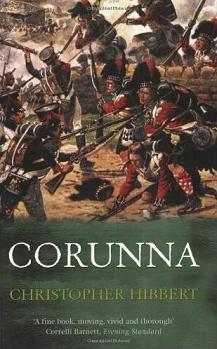Christopher Hibbert
Corunna

Military history at its best. Having found too many books on military history that are meant for professionals and experts on military matters, this was a more than nice surprise, since it is a very entertaining and accessible story of the battle of Coruña and its upcoming. Not easy to find a history book well written and for the general reader when it comes to the Napoleonic era, but this ones exceedes all my expectations: I shall take a note of finding more of Mr Hibbert's books, as I understand he is, or was, a gifted writer. The author's research is phenomenal, as the end reference testities. He used lots of minor and major testimonies and accounts of the soldiers who made this story, and he uses it to condense in a regular size book the story of the escape through Spain of the British forces of General John Moore towards La Coruña, and its final battle there in January 1809, with the utmost care to detail, and the presence of a sufficiently good description of the background of the story, never loosing sight of the people on the grouns, whether generals or privates, Spanish campesinos or the wives of the British soldiers who walked behind their men, some carrying babies on their backs. Their ordeal in Spain is the main story here.
The author is to be thanked for the care with which he treated geography as well as the populations, the little towns and villages through which the armies marched, how the Spaniards received the Brits and their participation in the war effort. It's a fine eye to detail, to the man and woman on the ground, that the author has, whether it is an infantry soldier, a wife of a soldier, a general or a tavern keeper in a little town, they all matter to the story because they help bring to life the drama of war, they pull out of the dusty books on military battles the human drama which is made up of names of real people and a huge amount of details that make up their lives, their suffering, their pain, their fight and sacrifice. It seems even hard to believe that such amount of detail is not fiction, come out of the writer's imagination, or history with a taint of fiction, but it is all true. The amount of time and effort that it must have taken the author to bring all this information into one whole story cannot but bring shame to those fiction writers who cannot convey as much interest into their stories as Mr. Hibbert does with reality. Truly it is craftsmanship that Mr. Hibbert has.
Comments and impressions on the land, the war and the Spanish folk are also to be found along the story, but they are not the historian's, they are picked by the writer but belong to the soldiers' testomonies. Strange as it seems, but maybe not as strange if you are Spaniard yourself, the Spanish folk was not at all keen on helping the Brits do their job. War is described in its crudest form, and the people were everyone for himself, only at Coruña -the end of the journey- do the Brits recognize a collective effort done by the citizens, in conjunction with the Redcoats, to help win the battle and save the town from the hated French. So this history of a battle is much more than that, it is plain adventure, history, but most of all -and fr which I am most glad- social history, without intending it. Here is an example of how good history is to be written: find what interests the common folk, pick your story, now tell it to them, instead of 'here is what you need to know. Great book. I will certainly look for more from this writer.
